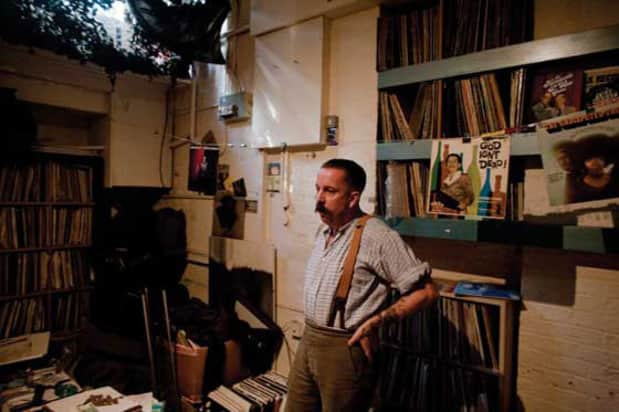We interviewed electronic music legend Andrew Weatherall for FADER #64 about the innovative production he added to Fuck Buttons' crazy amazing new record/teleportation device, Tarot Sport. He doesn't give many interviews but he granted us one since apparently we've been sending him comps of the magazine for nine years and we didn't even really know. Sweet! Coincidentally, Weatherall's also got an incredible new album of his own coming, A Pox on the Pioneers, which melds a wry humor with his laser production focus. "Walk of Shame" almost sounds like one, its beleaguered vocals countered by lightheaded guitar and synths. Download it below and read the full transcript of our interview with him about working with Fuck Buttons, arctic travelers and his obsession with Dashiell Hammett after the jump. Also, if you're in NYC this weekend, add Weatherall's stint at Club Love to the long list of unmissable DJ gigs going on tomorrow night.
Were you working on the Fuck Buttons record at the same time as A Pox on the Pioneers?
We finished mine about three weeks before we did Fuck Buttons. I’m not very good at multitasking I can’t work on most projects at the same time. I can get through projects fairly quickly—I can do a project in a day—but I’m not good at doing more than one thing at once.
How did you transition from finishing your record to Tarot Sport?
By listening to their demos and making a compilation of tracks that I was reminded of, sometimes tenuously. I just listened to music I thought they probably hadn’t listened to but immersed myself in all sorts of strange records from Moondog to Section 25. I gave them a compilation of things to see where they were coming from. It was a bit egotistical, I should have asked them for a similar CD, because hearing what they were listening to really helped finishing off the album. I should have thought about that before we started, rather than two days before the end of the album. That’s what producers have to be, somewhat egotistical, don’t they?
Tarot Sport is such a different sound from before, the vibe is there but it elevates them to this mystical mind mountain.
When I heard their first album I thought, if I were to produce their next one, this is what I would do and it all fell into place. All I wanted to do was bring out a sound that was already there because their first album’s great, but it’s just recorded as a live set with not much done to it. So we thought we’d record it live and then go back and expand and bring it out because there’s so much. We’re not gonna destroy your root sound, we’re just gonna bring out tones and frequencies and harmonics that you can’t get out of it with your own equipment. So we just opened up their sound. It’s 100 percent them but it’s expanded.
The album is mindblowing.
It’s a very physical record. At the end of the day I felt like I’d done a hard day’s work at the warehouse or on a building site or something. But that’s good cause that’s the sort of jobs I had when I was young, and I’ve always liked the feeling of a good job done after a hard day’s work. It’s quite satisfying for the working class in me. It was a very physical process. Basically we were doing 12 hour days, sometimes longer, five days a week. And it’s a physical fact that minor keys in certain music does affect your internal structure and the way you think. So to listen to music that intense 12 hours a week five days a week? It was great but it was very hard work and very painful. But that’s good because you know. You practice, struggle and the chase is more important than the end result.
How did you meet the Fuck Buttons?
Where I live in London, Shoreditch, my local pub is kind of like “spot the new band.” It’s just one of those places where there are lots of musicians and artists. I bought the record, loved it , and it turned out that someone in my local pub was their manager, been friends with him for years. He was like Glad you like it, do you fancy doing a remix? Did a remix, they liked that, well how about the new album. It was all very easy. There weren’t any record executives, not that [their label] ATP have got any executives, but. That’s why I don’t produce records that much, I like things to happen like that ,where it turns out we’re kind of friends. There’s a lot less pressure on it and it just means you make a better record. That’s how [Primal Scream’s] Screamadelica was done. that was just friends going into a studio, it wasn’t a kind of job being producer, it was pretty organic and that’s what I like. I like to work with people I have some kind of connection with. There’s not so much pressure. It frees you up, you don’t worry as much. Perhaps I should worry a bit more, you know, when the record industry’s dying a slow death, perhaps I should be a tad more concerned with what I’m doing.
Because you don’t produce a lot what was it like working with them?
It was good cause there was only two of them, all their equipment fits in a suitcase and there was no drummer. Let’s cut down the amount of musicians you have in the studio, that’s my philosophy, because they can be quite tedious, being in the studio for any length of time. So it was great, very punk rock. We recorded the album in three days, the rest was mixing and adding little parts rhythmically and musical parts. We could have made it sound like the first album, but in the three weeks that follows the three days, we made it sound like the album it is now. To come up with that under a month, we worked very hard and I think that it kind of shows.
You’ve worked so long doing this stuff. Is there anything you learned from those guys?
It did refresh things I know and had forgotten—like you don’t need the latest upgrade, you can make music with anything. It was a very punk rock record and that was nice to get an injection of punk rock now and again. I try to do it daily but sometimes I don’t achieve it. It’s just nice to engage with people.
What about working on your album, A Pox on the Pioneers?
It’s a similar process. I think because I come from a dance background everything starts with the drums and the bass. Steve would put in musical parts and my notebook has one liners and paragraphs and then I start working vocal lines. I’ve got lots of notebooks. I’m particularly fond of the dialogue in noir films, also Dashiell Hammett and detective stories from that era because they were writing for the common man but it’s quite sophisticated writing. What other writers might have the luxury of conveying in a chapter to describe a character, they had to describe them in one line that the modern man would understand. I just love that when you’re writing songs it’s compactness and brevity that you’re looking for. Not just from those books. I read a lot, history books. I read a book recently about Naples during the war, about a mafia boss who knew he was gonna be assassinated, and the mafia organized a big tribute for him. When he came, they killed him by sticking knitting needles through his kidneys. And I thought what a great story! The dilemma of being invited to your own tribute but knowing that you’re gonna die. That’s on the next album: an uplifting song about imminent death by knitting needle! Once more with feeling!
What’s the Pox on the Pioneers about?
Most of the songs on there about heroic failure. We like our pop stars to be fucked up and/or dead because then when you listen to them, it makes their pain seem more real, and the more real it is, the more powerful the medicine for your own pains and ills. It’s stronger voodoo. I’ve always been fascinated by the kind of people who push themselves toward the edge, those sorts of pioneers, but I also love books about arctic explorers that pushed physical boundaries and ultimately died to better our knowledge. I just thought writing songs about arctic explores was more exciting and interesting than writing about dead pop singers. The pop star about to blow his head off and the arctic explorer about to die in the middle of an arctic waste must curse that pioneering spirit that lead them there. There’s a price to pay, but basically they must have sat there and gone, Aw, fuck. What am I doing here? There’s a price to play. It’s not all glamour. They weren’t that happ— just so you can get your hit of rock and roll voodoo!
Have you heard the song “Primitive” by the Groupies? It’s one of my favorite tracks of all time. They were from NY, they were 17 and they had one amazing record and they thought they were gonna be massive but they just fucked their whole career up, getting arrested and such. They had a gig in the states and fucked it off, cashed their tickets in and flew to LA. Listen to it and you’ll kind of realize that feeling I’m trying to infuse in my music. Even if I’m making electronic music, I just love that sleazy feeling.
The premise is pretty dark.
Dark humor is in the Brit psyche. I was brought up on Monty Python and surreal comedy and I think that’s subconsciously in the music. People say your music’s dark but it’s not dark like sludge metal, it’s cartoon dark. I find darkness unsettling if you’ve got a childish melody over the top. It’s why music boxes and kids’ toy music is in horror films. It takes something innocent and puts it in a dark setting and makes it darker cause you’re adding a light element. That’s what I try to do with music, make the music box playing in the empty bedroom somewhere.

